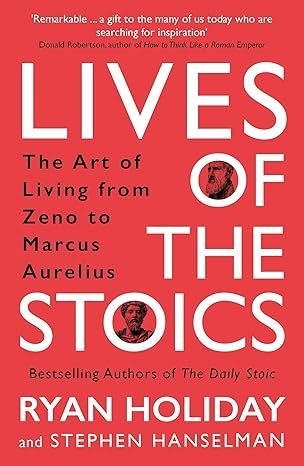Lives of the Stoics: The Art of Living from Zeno to Marcus Aurelius
4.7 out of 5
2,858 global ratings
THE INSTANT NEW YORK TIMES BESTSELLER
'In story after page-turning story, Lives of the Stoics brings ancient philosophers to life.' - David Epstein, bestselling author of Range
'Wonderful' - Chris Bosh, two-time NBA Champion
For millennia, Stoicism has been the ancient philosophy that attracts those who seek greatness, from athletes to politicians and everyone in between. And no wonder: its embrace of self-mastery, virtue and indifference to that which we cannot control has much to offer those grappling with today's chaotic world. But who were the Stoics?
In this book, Ryan Holiday and Stephen Hanselman offer a fresh approach to understanding Stoicism through the lives of the people who practiced it - from Cicero to Zeno, Cato to Seneca, Diogenes to Marcus Aurelius. Through short biographies of all the famous, and lesser-known, Stoics, this book will show what it means to live stoically, and reveal the lessons to be learned from their struggles and successes. The result is a treasure trove of insights for anyone in search of living a good life.
352 pages,
Kindle
Audiobook
Hardcover
Paperback
First published January 5, 2022
ISBN 9781788166010
About the authors
Ryan Holiday
Ryan Holiday is one of the world's bestselling living philosophers. His books like The Obstacle Is the Way,Ego Is the Enemy,The Daily Stoic, and the #1 New York Times bestseller Stillness Is the Key appear in more than 40 languages and have sold more than 5 million copies. Together, they've spent over 300 weeks on the bestseller lists. He lives outside Austin with his wife and two boys...and a small herd of cows and donkeys and goats. His bookstore, The Painted Porch, sits on historic Main St in Bastrop, Texas.
Read more
Reviews
Vince Vawter
5
Love the inside cover map
Reviewed in the United States on August 10, 2024
Verified Purchase
Well organized.
Tuomas R
5
Stoic lifes
Reviewed in the United States on July 22, 2024
Verified Purchase
This is intriguing and interesting book tells not about Stoic principles of living a good life, but about people who did live more or less according to these principles. Not what they said or taught, but what they did and how they lived. That Stoicism is really about. It is art of living and without action and real-life practice, it would be just dusty books in library shelf.
Read more
3 people found this helpful
Sonny N.
5
A Compelling Journey Through Stoic Philosophy and History
Reviewed in the United States on August 8, 2024
Verified Purchase
Lives of the Stoics: The Art of Living from Zeno to Marcus Aurelius by Ryan Holiday and Stephen Hanselman is a captivating exploration of the lives and teachings of Stoic philosophers. This book offers readers a profound and insightful look into the principles of Stoicism through the lens of its most influential figures.
The narrative is both engaging and informative, bringing to life the stories of key Stoic philosophers such as Zeno, Seneca, Epictetus, and Marcus Aurelius. Each chapter delves into the personal lives, struggles, and triumphs of these thinkers, highlighting how their philosophies shaped their actions and legacies. The authors skillfully intertwine historical context with philosophical insights, making the book both educational and entertaining.
Holiday and Hanselman’s writing is accessible and thought-provoking, providing a clear and relatable explanation of Stoic principles. The book not only explores the theoretical aspects of Stoicism but also demonstrates how these ancient teachings can be applied to modern life. The practical wisdom gleaned from each philosopher's life is presented in a way that is both inspiring and actionable.
One of the standout features of Lives of the Stoics is its ability to bring ancient philosophy to life in a way that resonates with contemporary readers. The authors’ deep understanding of Stoicism and their engaging storytelling make the book a valuable resource for anyone interested in personal development, resilience, and philosophical thought.
Overall, Lives of the Stoics is an exceptional read that offers both a historical perspective and practical guidance. It’s a must-read for anyone interested in Stoicism, philosophy, or personal growth. The book provides a rich and rewarding exploration of how the wisdom of ancient Stoic philosophers can still offer valuable lessons for living a meaningful and fulfilling life. Highly recommended for its insightful and inspiring content!
Read more
2 people found this helpful
Paul A. Mackey
5
Valuable Overview of Stoic Philosophers
Reviewed in the United States on July 8, 2024
Verified Purchase
Lives of the Stoics is a fantastic introduction to pillars of Stoicism and whetted my appetite to dig deeper and learn more. Stoicism is a practical philosophy that is as relevant today as it was in ancient times.
2 people found this helpful
Chris Plemmons
5
Highly Recommend
Reviewed in the United States on October 25, 2023
Verified Purchase
This is a great history and information about the original and influencers of Stoicism. I really enjoyed reading and studying this book. It's a treasure-trove of information, laid out well and easy to read. Each chapter is a specific historical figure. You can read this start to finish, or go back and randomly flip to a chapter and re-read it. This is a book I go back to over and over each year. Highly recommend if you have any interest in the Stoics at all.
Read more
12 people found this helpful
JSJ
5
I found my Cato and more
Reviewed in the United States on January 15, 2021
Verified Purchase
It's one thing to study Stoicism and to try to live as one practicing the four cardinal virtues and Stoic principles and beliefs. This book describes how the earlier Stoics lived, the events during their lifetime, their actions, and what we can learn from their experiences (Cicero, Arris, Agrippinus). It provides guidance on what actions I can take as a Stoic.
Each Stoic profiled had a role to play, a job to do, which was not doing it all but doing part of the work. I, like them, don't have to and cannot do it all. Being a Stoic in the real world is not about being perfect because we do not live in a perfect world. Each person has a role to play and a job to do for the common good. There is no person who can do it all.
Lives of the Stoics gives me hope about getting through tough times, makes it easier to accept and move on with reality, helps to make the world a better place for my fellow human beings, and provides examples so that I can act and do things one step at a time.
Read more
4 people found this helpful
Gary Moreau, Author
4
Courage, Temperance, Justice, Wisdom
Reviewed in the United States on September 30, 2020
Verified Purchase
This book is a history of Stoicism. More accurately it is a compilation of mini-biographies of the most famous Stoics from Zeno (334 BCE – 262 BCE) to Marcus Aurelius (121 AD - 180 AD), the Platonian philosopher king, as well as Cicero, Cato the Younger, and Porcia Cato the Iron Woman, among others.
Stoicism is built around four virtues: “Courage, Temperance, Justice, [and] Wisdom.” And that’s pretty much it. There are no rituals, no sacred text, and no organized institution of worship.
There were recognized “leaders”, Zeno being the first, but they didn’t have offices or official duties, as Stoics at least. They were teachers, authors, politicians, and generals. Aurelius even became Emperor.
They were considered philosophers, but few resembled philosophers as most of us think of that moniker today. The word philosophy has had an extremely fluid and often imprecise etymology over the centuries. The first definition offered by Webster’s today is “all learning exclusive of technical precepts and practical arts.” At the time of Newton, however, science and philosophy were used synonymously. During the early days of Stoicism, “Zeno divided the curriculum of Stoicism into three parts: physics, ethics, and logic.”
The meaning of stoicism has changed as well. “The word ‘stoic’ in English [today] means the unemotional endurance of pain.” To the Stoics, however, Stoic was all about the active pursuit of virtue and justice. It was a pro-active quality, not a defense mechanism.
There was/is an emphasis on listening. “Zeno said that we were given two ears and one mouth for a reason…” And it was forward looking. We die the day we are born in the sense that the time already past in our lives is not something we can do anything about. We can only try harder, pursuing to improve that which we can control and accepting that which we can’t. Don’t worry about the rules, just do it, to adopt a modern commercial tag line.
The other distinguishing characteristic of Stoicism is the emphasis on the common good, not self-interest. Many Stoics went into politics out of a sense of obligation, not a grab for power and wealth.
Stoicism is a way to live that no Stoic has ever fully achieved, however, although some of the Stoics described clearly led virtuous lives by any standard. But not perfect.
Many were born into wealth and privilege. Nearly all accepted the institution of slavery (one of the most famous Stoics had been a slave) and the brutality of war. But, as the authors conclude, “Most of all, the Stoics taught us by the fact that they tried.”
I was often reminded of Confucius (551 BCE – 479 BCE) throughout the book and he is referenced a few times. Confucius lived during a tumultuous time in the history of China. Neighboring fiefdoms were at constant war and Confucius was ultimately called upon to help sort it all out.
He concluded that peace could never be fully maintained by the armed agents of the state (i.e. the police or the military). As soon as that authority leaves, as lethally as it may be armed, the mayhem would return. He understood, quite correctly, that self-restraint is the only weapon against constant bedlam and that self-restraint would only take hold if there was a value system of peace and cooperation shared by all. And for him that value system turned on the internalization of values and behaviors built on an inviolate sense of obligation to others. (Pretty Stoic, I think.)
It is a worthy set of values, to be sure. But not always easy to live by 24/7. There are contradictions in every philosophy and belief system. A devout Stoic, Rusticus had a Christian who did no more than follow his faith put to death. Not because he found him deserving – he didn’t - but because that was the law of Rome at the time. And Seneca, one of history’s most famous Stoics, was a tutor and advisor to Nero, perhaps the most deranged and ruthless leader of all time.
But why write this book now? Stoicism remains an active, if inconspicuous, philosophy among many, including some in positions of political power.
Well, there is little possible debate that America today is starting to look a lot like Rome before its collapse. Greed, corruption, and the pursuit of self-interest at the expense of the common good are in abundant supply. And these are, in fact, the antithesis of the virtue and justice that Stoicism stands for. If only we had three ears and four eyes and could look away from our technology for just a moment we’d see it.
In the end this is a very good book and very well written by two authors who are eminently qualified to write it. I didn’t give it a 5 only because that didn’t seem like the Stoic thing to do. Just kidding. I would have liked to see more philosophical exploration of why the four virtues are the right ones, but that is admittedly a failure of my own expectation, not the authors’ promise, which they deliver fully on.
Read it. You will learn much from the lives portrayed.
Read more
68 people found this helpful
Nico Vela
4
A great book
Reviewed in the United States on July 18, 2024
Verified Purchase
A great book on stories of the Lives of the Great Stoics. I cannot vouch for the historical accuracy (something that I have seen in Ryan's books is that some of the information os contrary to established historiography), but it is an easy, and compelling read.
Dominic
3
Although a good book which tries to appeal the reader to live virtuously, it has some deficiencies
Reviewed in the United States on October 7, 2020
Verified Purchase
I had originally wrote this in response to Rogue ones review. However, I think this also would be a good review in itself. Therefore the following is simply a copy and paste as to what I already wrote as a response. However, I would like to say that the book is good overall and is okay for the general person:
Although I have a mostly positive view of the book, RogueOne does a good job in criticizing the text. In particular, I agree with his critique on Ryan Holiday's approach on being "one of the world's foremost thinkers and writers on ancient philosophy and its place in everyday life" while not trying to be "strict scholarly accurate." In some of the early stories, although he gives good general advice on how to apply stoic morality, some of these stories do seem a bit contrived or at least inaccurate. One major example is his biography on 'Aristo the challenger.' In this section he cites the ancient Greek author Diogenes Laertius (translated in English by Pamela Mensch, which book I have as well) who he claimed said "Your a babbler... and I suspect your father was drunk when he sired you" (p. 32). He also portrays Aristo as arrogant and claiming to be a wise man (p. 33-34). Finally, he seems to think that stoic orthodoxy was established during the "tenure" of Zeno.
In concerns with the first part, Diogenes never relates Zeno chiding Aristo for any kind of arrogant behavior in the biography of either men (or any stoic in the book). Although Holiday does not look for strict scholarly accuracy, the factor of 'truth' is certainly important. As a thinker who wants to apply ancient philosophy today, he should realize that ancient philosophers were looking for an abstract notion of "Truth" and trying to live in accordance to it. If he tries to tell moral stories and passes information not founded in the text he cites, than that in itself is immoral (if done intentionally to promote his own viewpoint) and quite frankly, against the stoic principles he professes.
Concerning the second part, the story of the two brothers is found in Diogenes. However, it tells nothing of how he considers himself a wise man or being arrogant. In the text we both use (that is Pamela Mensch's translation), it says "Ariston was especially attached to the stoic doctrine that the wise man does not hold opinions. Perseus, seeking to oppose this doctrine, had one of a pair of twin brothers deposit a sum with Ariston, and then got the other to reclaim it. Duly perplexed, Ariston was thus refuted" (p.369). Here, Diogenes relates that this was in fact a stoic doctrine (and it is). Holiday says this was not and that Zeno sent a stoic scribe was sent to refute him. Instead, the text does not mention Zeno sending anybody and simply a fellow stoic simply wanting to refute him. It also does not record any embarrassment that Holiday relates (p34). Again, he is either getting his information from another source or simply creating evidence to fit his own narrative (which seems the more likely).
In accord to the final point in the Aristo chapter, he relates stoicism as an actual school. In the Cambridge Companion to the Stoics (which he claims he has consulted), the article "The School, from Zeno to Arius Didymus" by David Sedley explicitly states that the school's members during Zeno's time were "highly independent and a heterogeneous group...only after the founder's death that his though and writings were canonized" (p. 14-15). As this was written by one of the most well-known experts in Hellenistic philosophy and stoicism, Holiday's claim as one of the foremost thinkers in ancient philosophy is not looking promising.
In addition to this, he claims that the debates over virtue were akin to the medieval monks arguing how many angels could fit into a pin. He likened them as useless. However, if he was a true stoic, he should know (again) that they thought of truth as foundational and its application of truth as a way of living a good life. It is in Stoic epistemology in which truth is found and then applied to stoic ethics. The knowledge of the good and its application once the mind was formed rationally was part of its tripartite education (beginning with logic, then ethics, and finally physics) Again this is found in the work Cambridge Companion to the stoics he has consulted.
One final example (their are certainly more) is the biography of Zeno himself. He claims that Zeno masterfully rebutted Plato in his Republic. Since we do not have the text, we do not have evidence if he intended to argue against Plato or not. However, according to scholarly studies (if I remember correctly), ancient philosophers did make a "Republic" work outlining their own ideas of what constituted the ideal state. Although he does state Zeno's ideal of equality (p. 8), he does not state Zeno's claims in his book as reported by Diogenes that "general education is useless" or "he prohibits the building of temples, law courts, and gymnasia in cities" (p.326-327). Along with not being entirely truthful (whether ignorant or intentionally), he carefully chooses his evidence to fit his thesis rather than making a thesis in accord with the evidence.
My final complaint of Holiday is his lack of citation. If truly practicing stoics were interested in the facts he relates in his stories, they would not doubt want to know the exact source of where he found it so they can see it for themselves. Since he does not do this, he robs his audience of not only a convenient way to grow in stoic philosophy, but also shows how unreliable he is as an author. As shown above, some of his information is likely (although I cannot say since I have not read all scholarship on stoic philosophy) fabricated and interpreted from his own point of view which actually construes what stoics actually believe. Although he does a good job in trying to enforce the stoic spirit of living a good life, his means of doing so is flawed through a strong cherry-picking of evidence and potential misrepresentation of stoic lives.
Read more
30 people found this helpful
RogueOne
1
(Speculative) Fiction of the Stoics
Reviewed in the United States on October 6, 2020
Verified Purchase
The Lives of the Stoics is the latest installment in Mr. Holiday’s popularization of the Stoic philosophy. It consists of 26 short “biographies” of major and minor Stoic figures. It is an ambitious project, but it is poorly executed in many ways.
1/ the author states that the purpose of the book is to inspire the reader to emulate the lives of the Stoics. “Strict scholarly accuracy” is not his concern. The result is a speculative biography about each figure, especially those about whom little written material survives. As any biographer will tell you, speculative biography is the least reliable and the most likely to lend itself to authorial invention and (mis)interpretation.
2/ the convention of giving each figure an epithet (e.g. Zeno the Prophet) is a little too contrived and frankly comes across as precious and forced. Not only is not accurate historically (Zeno was never called the Prophet, Seneca was never called the Striver), but it often fails miserably - specifically “Gaius Rubellius Plautus the Man Who Would Not Be King.” This literary contrivance sounds like a teenager’s fantasy WWE game.
3/ the author fails to be consistent in his use of political terms for the ancient world. He uses kings, rulers, tyrants, dictators, and emperors all interchangeably when describing the Roman Emperor (except when he talks about Marcus Aurelius, who, in his eyes, could do no wrong). This is just sloppy writing - the Romans were very clear about not having kings (during the Republic) and emperors were very different from kings.
4/ the author is dire need of a better editor. A common stylistic choice he employs is to break up a quotation with the redundant “he writes,” or “he said,” or some other rendition. For example, from page 32, “ ‘We might ask,’ Chryssipus pressed, ‘how could we live a life if it didn’t matter to us whether we were well or sick...”. He often then add his own commentary onto the quotation, which comes across as pedantic and condescending. “Indeed, how could we? Life would be chaos.”
5/ the author is in dire need of an editor, part two. The author spends so much time fleshing out each figure with suppositions and speculations that he repeats himself, and as a result, many of the figures appear to be the same because he is asking the same questions. I found myself re-writing many sentences in my head with fewer words, far too often. The constant sentence fragments. Single word sentences. Sloppy writing. Get my point? It made reading the book seem like a chore, rather than an exploration.
6/ it is no surprise that the author’s training as a marketer influences how he writes. He has the habit of qualifying everything he likes with “beautiful,” “great,” “beloved,” and “wonderful.” The result is this reader felt like he was being drowned in sugar. My eyes rolled more times than some of the Stoics were probably rolling in their graves.
7/ for an author who wrote a book called Ego is the Enemy, it is ironic that his author’s bio describes him as “one of the world’s foremost thinkers and writers on ancient philosophy and its place in everyday life.” Even more ironic given that his stated aim in the book is not “strict scholarly accuracy.”
A five-star idea with a one-star execution. Go elsewhere for an introduction to the stoics.
Read more
361 people found this helpful
Top Ryan Holiday titles
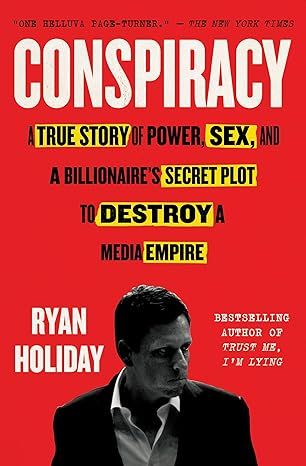
Conspiracy: A True Story of Power, Sex, and a Billionaire's Secret Plot to Destroy a Media Empire
4.3
-
1,965
$5.99
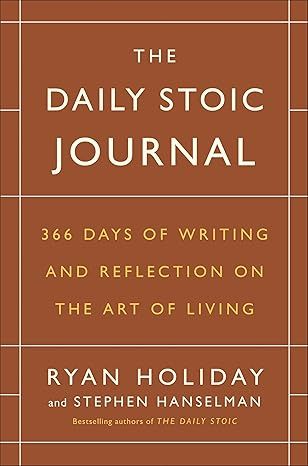
The Daily Stoic Journal: 366 Days of Writing and Reflection on the Art of Living
4.7
-
2,537
$15.99
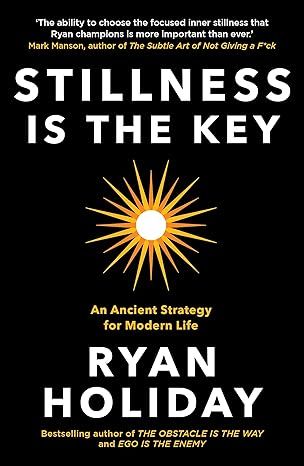
Stillness is the Key: An Ancient Strategy for Modern Life
4.7
-
9,966
$8.99
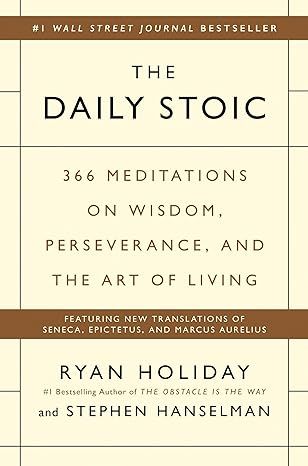
The Daily Stoic: 366 Meditations on Wisdom, Perseverance, and the Art of Living
4.8
-
32,641
$13.00
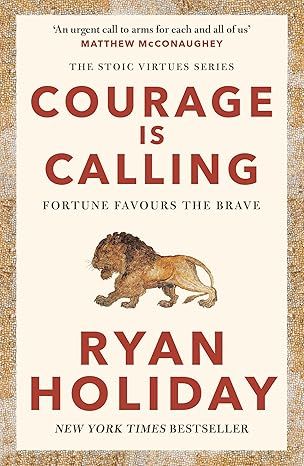
Courage Is Calling
4.6
-
4,763
$13.35
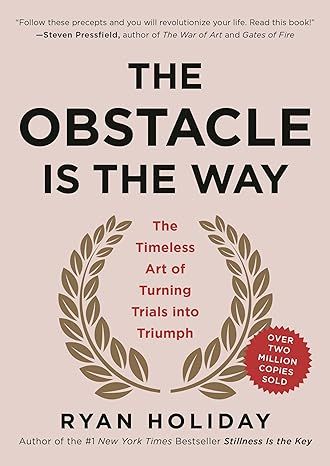
The Obstacle Is the Way: The Timeless Art of Turning Trials into Triumph
4.6
-
28,125
$4.99
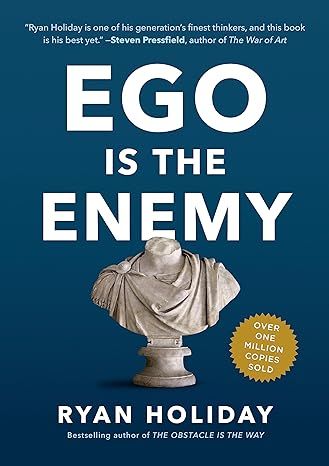
Ego is the Enemy: The Fight to Master Our Greatest Opponent
4.6
-
20,573
$11.99
Best Sellers

The Tuscan Child
4.2
-
100,022
$8.39

The Thursday Murder Club: A Novel (A Thursday Murder Club Mystery)
4.3
-
155,575
$6.33

Sapiens: A Brief History of Humankind
4.6
-
140,302
$13.49

The Butterfly Garden (The Collector, 1)
4.3
-
88,556
$9.59

Things We Hide from the Light (Knockemout Series, 2)
4.4
-
94,890
$11.66

The Last Thing He Told Me: A Novel
4.3
-
154,085
$2.99

The Perfect Marriage: A Completely Gripping Psychological Suspense
4.3
-
143,196
$9.47

The Coworker
4.1
-
80,003
$13.48

First Lie Wins: A Novel (Random House Large Print)
4.3
-
54,062
$14.99

Mile High (Windy City Series Book 1)
4.4
-
59,745
$16.19

Layla
4.2
-
107,613
$8.99

The Locked Door
4.4
-
94,673
$8.53
